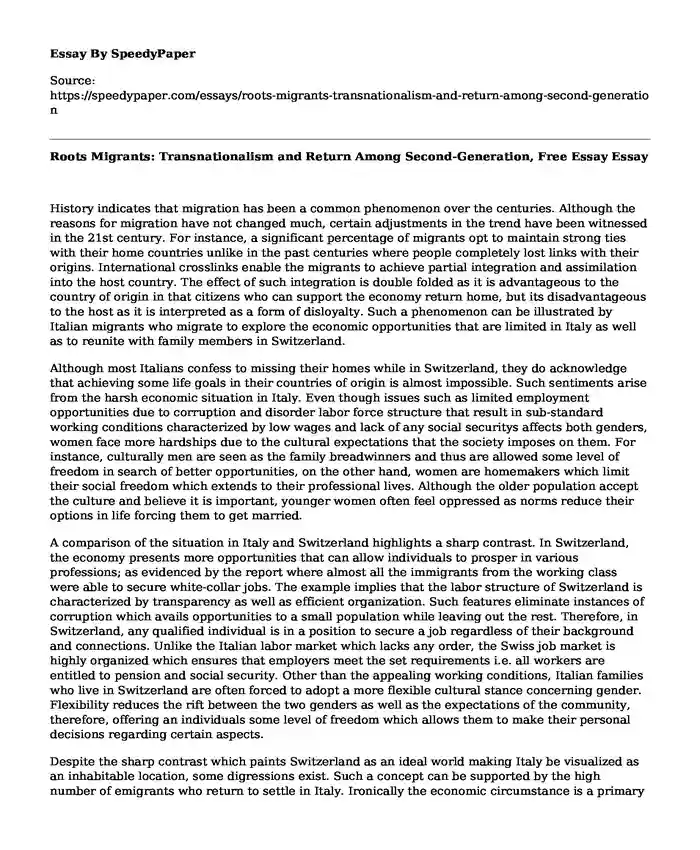
| Type of paper: | Essay |
| Categories: | Immigration |
| Pages: | 3 |
| Wordcount: | 824 words |
History indicates that migration has been a common phenomenon over the centuries. Although the reasons for migration have not changed much, certain adjustments in the trend have been witnessed in the 21st century. For instance, a significant percentage of migrants opt to maintain strong ties with their home countries unlike in the past centuries where people completely lost links with their origins. International crosslinks enable the migrants to achieve partial integration and assimilation into the host country. The effect of such integration is double folded as it is advantageous to the country of origin in that citizens who can support the economy return home, but its disadvantageous to the host as it is interpreted as a form of disloyalty. Such a phenomenon can be illustrated by Italian migrants who migrate to explore the economic opportunities that are limited in Italy as well as to reunite with family members in Switzerland.
Although most Italians confess to missing their homes while in Switzerland, they do acknowledge that achieving some life goals in their countries of origin is almost impossible. Such sentiments arise from the harsh economic situation in Italy. Even though issues such as limited employment opportunities due to corruption and disorder labor force structure that result in sub-standard working conditions characterized by low wages and lack of any social securitys affects both genders, women face more hardships due to the cultural expectations that the society imposes on them. For instance, culturally men are seen as the family breadwinners and thus are allowed some level of freedom in search of better opportunities, on the other hand, women are homemakers which limit their social freedom which extends to their professional lives. Although the older population accept the culture and believe it is important, younger women often feel oppressed as norms reduce their options in life forcing them to get married.
A comparison of the situation in Italy and Switzerland highlights a sharp contrast. In Switzerland, the economy presents more opportunities that can allow individuals to prosper in various professions; as evidenced by the report where almost all the immigrants from the working class were able to secure white-collar jobs. The example implies that the labor structure of Switzerland is characterized by transparency as well as efficient organization. Such features eliminate instances of corruption which avails opportunities to a small population while leaving out the rest. Therefore, in Switzerland, any qualified individual is in a position to secure a job regardless of their background and connections. Unlike the Italian labor market which lacks any order, the Swiss job market is highly organized which ensures that employers meet the set requirements i.e. all workers are entitled to pension and social security. Other than the appealing working conditions, Italian families who live in Switzerland are often forced to adopt a more flexible cultural stance concerning gender. Flexibility reduces the rift between the two genders as well as the expectations of the community, therefore, offering an individuals some level of freedom which allows them to make their personal decisions regarding certain aspects.
Despite the sharp contrast which paints Switzerland as an ideal world making Italy be visualized as an inhabitable location, some digressions exist. Such a concept can be supported by the high number of emigrants who return to settle in Italy. Ironically the economic circumstance is a primary factor that influences the immigrants decision to go home. Although Switzerland offers better employment opportunity, the high cost of living takes up a considerable amount of an individuals monthly wages thus slowing down the rate at which a person can prosper. On the contrary, Italy offers limited opportunities, but the cost of living is relatively low thus allowing a much faster rate of development. This kind of a situation only gives an individual a single option which entails migration to Switzerland where one can get a job and save enough cash and then return home to use the savings to prosper. Another factor that motivates emigrants to return home is social security. Although a significant number of young women complain that Italian culture limits their freedom, they also acknowledge that the strong family ties offer them some security which they cannot get in the foreign country.
Each country seems to have some advantages as well as disadvantages placing them on the same platform. A persons choice to live in either Italy or move to Switzerland depends on his/her needs; this explains while most working-class population opt to migrate to Switzerland for some years and then return to settle in Italy. Even though the conditions in Switzerland seem more attractive than those in Italy, a permanent choice often means gaining one element at the expense of the other. Understanding such a notion can help the young generation to cope with the prevailing circumstances in a given country. For example, they can learn to live under constant community observation as long as they feel secured in the tightly knit family setting.
Cite this page
Roots Migrants: Transnationalism and Return Among Second-Generation, Free Essay. (2019, Sep 09). Retrieved from https://speedypaper.com/essays/roots-migrants-transnationalism-and-return-among-second-generation
Request Removal
If you are the original author of this essay and no longer wish to have it published on the SpeedyPaper website, please click below to request its removal:
- Two Kinds by Amy Tan Essay Example - Free Samples From SpeedyPaper
- Ethics Case Study Scenarios Post-Partum Depression and Risk
- Export Strategy Essay Sample from Our Database
- Essay Sample on Reasons Why Different Cultures Make Art
- Contemporary Sculpture Essay Sample
- Free Essay on The Mistreatment of Major Depressive Disorder
- Report on the Conflict Between the Public and Police Following the Assassination of George Floyd - Free Essay
Popular categories




